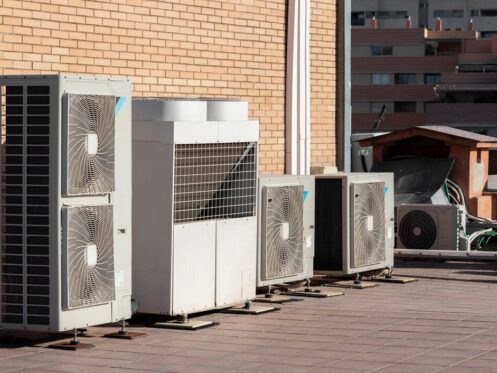A comfortable home environment involves maintaining the right temperature and ensuring the quality of the air you breathe. One critical component contributing to your home’s indoor air quality is the air filter in your air conditioning system. With numerous air filter options available, selecting the most suitable one for your needs can significantly impact your home’s air quality and your air conditioner’s efficiency. Our team of experienced professionals at Midwest Mechanical is dedicated to helping you choose the perfect air filter for your cooling system in Wichita, KS, and the surrounding areas.
Continue reading as we discuss the essential factors to consider when selecting an air filter for your air conditioner, such as filter type, size, and efficiency. Investing in the right air filter can effectively reduce airborne contaminants, allergens, and pollutants in your home while promoting the efficient operation of your cooling system. Our knowledgeable team is here to provide expert guidance on choosing the best air filter for your needs, ensuring a healthy and comfortable living environment.
1. Understanding the Different Types of Air Filters
To choose the perfect air filter for your air conditioner, it’s essential to understand the different types available on the market. These filters vary in material, design, and efficiency, affecting their ability to trap airborne particles and improve indoor air quality.
Fiberglass Filters: These are the most basic type, consisting of a disposable, multi-layer fiberglass mesh. Although they are budget-friendly, they offer limited filtration capabilities and mainly protect the air conditioner from larger debris.
Pleated Filters: Made from polyester or cotton folds, pleated filters provide better air filtration compared to fiberglass filters. Their increased surface area allows them to trap more particles and allergens without significantly restricting airflow.
Electrostatic Filters: These filters utilize electrostatic charges to attract and capture airborne particles. Available in both disposable and washable versions, electrostatic filters offer improved air filtration and can effectively remove allergens, bacteria, and other pollutants.
High-Efficiency Particulate Air (HEPA) Filters: These are the gold standard in air filtration, capable of capturing 99.97% of particles as small as 0.3 microns. However, HEPA filters require a compatible air conditioning system to handle increased airflow resistance.
Our professionals can help you determine which filter type is most suitable for your air conditioner and specific air quality needs.
2. Selecting the Right Filter Size for Your Air Conditioning System
One critical aspect of choosing the right air filter is ensuring it fits your air conditioner correctly. Using a filter that is too small or too large can reduce system efficiency and compromise indoor air quality. The size of an air filter is typically indicated by its length, width, and thickness. It’s essential to consult your air conditioner’s owner’s manual or consult with our experts to determine the proper filter size for your system.
3. Evaluating Air Filter Efficiency and Performance
Air filter efficiency is usually measured using the Minimum Efficiency Reporting Value (MERV) rating system, ranging from 1 to 20. Higher MERV ratings indicate better filtration performance, with the filter capable of trapping smaller particles.
Low MERV Rating (1-4): Filters with low MERV ratings are typically fiberglass filters that offer basic protection for your air conditioner but limited air filtration for your home.
Medium MERV Rating (5-13): Pleated filters and some electrostatic filters fall into this category, providing improved air filtration suitable for most homes.
High MERV Rating (14-20): High-performing filters, such as HEPA filters, have high MERV ratings and excel at capturing even the smallest particles. These filters are ideal for individuals with allergies or respiratory issues but may require specialized air conditioning systems to accommodate the increased airflow resistance.
Our technicians can help you choose the most efficient air filter for your system while also considering your specific indoor air quality requirements.
4. Maintaining Your Air Filter for Optimal Performance
Regular maintenance is crucial for the effective operation of your air filter and the overall performance of your air conditioning system.
Inspection: Routinely inspect your air filter to check for excessive dust and dirt accumulation. This helps determine when a replacement or cleaning is necessary.
Replacement or Cleaning: Depending on the type of filter, replace disposable filters or clean reusable filters according to the manufacturer’s recommendations. A general guideline is to replace or clean your filter every 1-3 months for optimal performance.
Professional Assistance: Our experienced technicians are ready to help with regular filter maintenance, checking the condition of your air filter, and providing expert guidance on replacement and cleaning intervals.
Trust Our Team to Help Improve Your Home’s Indoor Air Quality
Selecting the right air filter for your air conditioning system is crucial for enhancing indoor air quality and ensuring the efficient operation of your cooling system. You can significantly improve your home’s air quality by understanding the differences between filter types, selecting the correct size and efficiency, and performing regular maintenance.
Trust our dedicated team at Midwest Mechanical to guide you through the process of selecting and maintaining the perfect air filter for your air conditioning system and the surrounding areas. Contact us today to learn more about air filter replacement in Goddard and experience our unwavering commitment to exceptional service.
